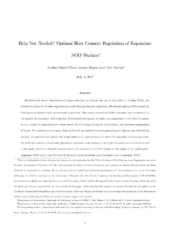| dc.contributor.author | Glazer, Amihai | |
| dc.contributor.author | Hagen, Rune Jansen | |
| dc.contributor.author | Rattsø, Jørn | |
| dc.date.accessioned | 2018-08-03T11:14:15Z | |
| dc.date.available | 2018-08-03T11:14:15Z | |
| dc.date.issued | 2018-05 | |
| dc.Published | Glazer A, Hagen RJ, Rattsø J. Help not needed? Optimal host country regulation of expatriate NGO workers. Review of International Economics. 2018;26(2):302-321 | eng |
| dc.identifier.issn | 1467-9396 | |
| dc.identifier.issn | 0965-7576 | |
| dc.identifier.uri | https://hdl.handle.net/1956/17979 | |
| dc.description.abstract | Motivated by interventions in poor countries to increase the use of local labor in foreign nongovernmental organizations (NGOs), we address the behavior of these organizations under host government regulation. We extend existing NGO models by distinguishing between local workers and expatriates. The model covers both NGO monopoly and competition in the market for donations. Assuming that NGOs maximize output, we show that regulations in the form of a quota on the number of expatriates or a work permit fee for foreigners reduces NGO output, but increases employment of locals. The optimal quota is more likely to bind in the market structure generating the highest total fundraising surplus. An optimal work permit fee is equivalent to an optimal quota in both the monopoly and duopoly cases. For both instruments, the optimal tightness of regulation is decreasing in the weight the government attaches to the public good relative to domestic incomes and in the importance of NGO output to the supply of the public good. Aggregate NGO output and the level of the public good produced could be higher with a monopoly NGO. | en_US |
| dc.language.iso | eng | eng |
| dc.publisher | Wiley | eng |
| dc.title | Help not needed? Optimal host country regulation of expatriate NGO workers | eng |
| dc.type | Peer reviewed | en_US |
| dc.type | Journal article | en_US |
| dc.date.updated | 2018-04-12T07:35:38Z | |
| dc.description.version | acceptedVersion | |
| dc.rights.holder | Copyright 2017 John Wiley & Sons, Ltd. | en_US |
| dc.identifier.doi | https://doi.org/10.1111/roie.12332 | |
| dc.identifier.cristin | 1518013 | |
| dc.source.journal | Review of International Economics | |
| dc.source.pagenumber | 302-321 | |
| dc.identifier.citation | Review of International Economics. 2018;26(2):302-321 | |
| dc.source.volume | 26 | |
| dc.source.issue | 2 | |
